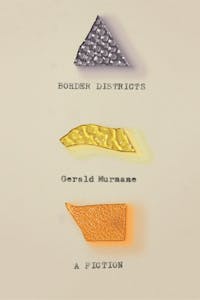Border Districts
A Fiction
 Download image
Download image
ISBN10: 0374115753
ISBN13: 9780374115753
Hardcover
144 Pages
$22.00
CA$29.00
“The mind is a place best viewed from borderlands . . .”
Border Districts, purportedly the Australian master Gerald Murnane’s final work of fiction, is a hypnotic, precise, and self-lacerating “report” on a life led as an avid reader, fumbling lover, “student of mental imagery,” and devout believer—but a believer not in the commonplaces of religion, but rather in the luminescence of memory and its handmaiden, literature.
In Border Districts, a man moves from a capital city to a remote town in the border country, where he intends to spend the last years of his life. It is time, he thinks, to review the spoils of a lifetime of seeing, a lifetime of reading. Which sights, which people, which books, fictional characters, turns of phrase, and lines of verse will survive into the twilight? A dark-haired woman with a wistful expression? An ancestral house in the grasslands? The colors in translucent panes of glass, in marbles and goldfish and racing silks? Feeling an increasing urgency to put his mental landscape in order, the man sets to work cataloging this treasure, little knowing where his “report” will lead and what secrets will be brought to light.
Border Districts is a jewel of a farewell from one of the greatest living writers of English prose.
Reviews
Praise for Border Districts
"Murnane, in his unfailingly serious way, is very funny . . . we read and think about him ruminating on his reading and thinking about reading and thinking until the book rather gloriously threatens to swallow itself whole."—Lidija Haas, Harper's Magazine
"Devotees of Murnane (The Plains), the exacting Australian writer of crafty, austere fictions, will find familiar themes in this prismatic work: the fascination with color, the grassy landscapes, and the obsessive compiling of a mind’s 'image-history.' The aged narrator, a 'student of colors and shades and hues and tints,' has retired to a 'district near the border' of his unnamed native land. There he explores the regions of his psyche with a monklike devotion, 'study[ing] in all seriousness matters that another person might dismiss as unworthy, trivial, childish.' These include his lifelong enchantment with marbles and stained glass, his mental album of 'image-heroines' (the Madonna, Thomas Hardy’s Tess), and a remembered line from Virgil’s Aeneid about the reddening dawn. He looks at his surroundings askance to make himself 'more alert to what appears at the edges of [his] range of vision,' attuning himself to the borderlands of his senses, as it were. He is punctilious in scrutinizing his own narration, insisting on classifying his text as a 'report of actual events' and including compositional updates ('While I was writing the previous sentences . . .') and revisions as he goes. Murnane’s mysterious, exquisitely constructed novel lingers with the reader just like the images that have indelibly imprinted themselves on the narrator’s mind."—Publishers Weekly
"An old man ruminates on landscapes and houses, authors and religion, colored glass and memory in this drifting quasi-fiction. The unnamed narrator, age 72, has recently moved from a city to live alone in a 'quiet township' near an unspecified border in an unnamed country. In the opening pages, he recalls his school days and the religious brothers who taught him. The colored glass in a church window sparks memories of a book that describes men during the Commonwealth period in the 17th century smashing the stained-glass windows of churches in England. A partial picture of the narrator emerges with references to teaching, marriage, children, relatives, and childhood horse-racing interests. But there’s little ongoing narrative, just vignettes scattered among musings on visual perception and recollections of houses, books, and colored glass. The preoccupations with how one has seen the world and with memory suits an older man and a writer; the prose, with its precision, repetition, and verbal footnotes, smacks of an academic lecturer. Despite the subtitle, the narrator insists he is 'not writing a work of fiction' but recording a 'sequence of images,' or 'a chain of thoughts.' The chain in one 12-page stretch includes a Proust allusion, a book jacket’s author photo, childhood marbles, a kaleidoscope bought in Virginia, the colored glass in kaleidoscopes, 120 colored pencils, and marbles on a carpet which the narrator moves in the hope that a chance arrangement 'would restore to me some previously irretrievable mood.' In search of lost marbles? No, the narrator is utterly rational. The sui generis Australian writer Murnane (The Plains, 2017, etc.) is at least eccentric. He seems to be showing how a writer’s mind works when he is writing and when he is riffling through or riffing on vision, insight, and memories. A fascinating, provocative, sometimes frustrating read; the stylistic tics may grow tiresome but Murnane’s intriguing ideas and oblique angles rarely do."—Kirkus Reviews (starred review)
Reviews from Goodreads
BOOK EXCERPTS
Read an Excerpt
Two months ago, when I first arrived in this township just short of the border, I resolved to guard my eyes, and I could not think of going on with this piece of writing unless I were to explain how I came by that odd expression.
I got some...



